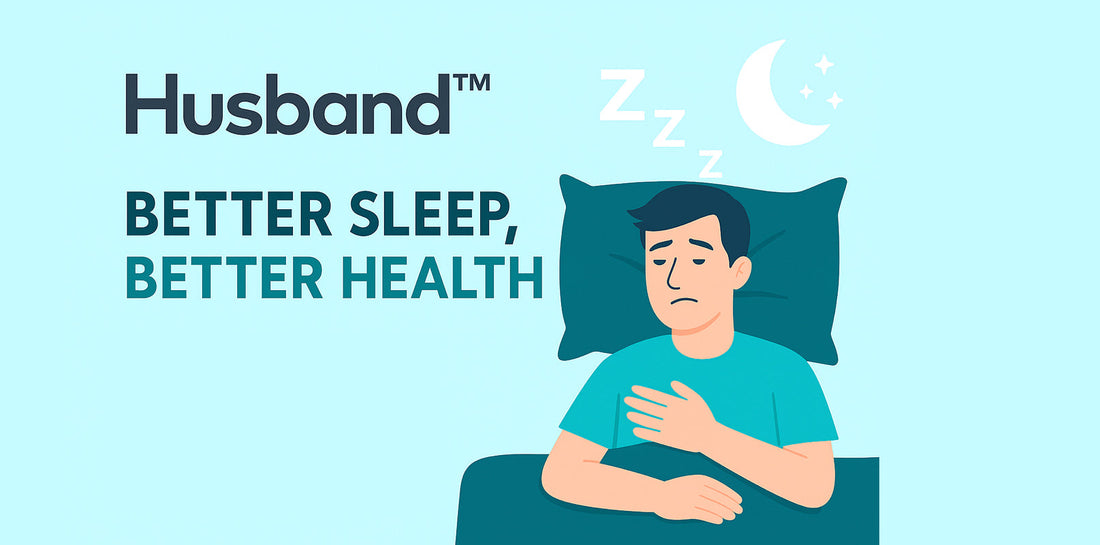
He’s not lazy. He’s not unmotivated. He’s just not sleeping.
By Bryce WyldeWhen your partner isn’t sleeping well, you know it—before he even admits it. He’s groggy in the morning, scattered through the day, short-fused in the evening, and either wide awake at 2 a.m. or passed out the moment he sits down. Sleep issues in men over 40 are one of the most misunderstood and most treatable drivers of low energy, poor metabolism, and hormonal decline.
That’s why HUSBAND doesn’t just ask about sleep, we test for what’s sabotaging it and support the systems that restore it.
What It Means to “Test Sleep”
You can’t fix sleep just by counting hours. HUSBAND uses at-home lab testing to identify the underlying physiology that shapes how well he falls asleep, stays asleep, and wakes up. Our lab panels go beyond what any wearable can tell you by measuring:
-
Cortisol – Is stress driving his brain into overdrive at night?
-
Melatonin (indirectly via circadian markers) – Is his day/night rhythm working against him?
-
Vitamin D – Is he missing the sunlight signal that regulates melatonin?
-
Insulin & HbA1c – Is blood sugar spiking or crashing during sleep?
-
Testosterone & Estradiol – Are hormone imbalances disrupting his REM cycles?
-
Inflammation markers – Is systemic inflammation creating micro-disruptions in deep sleep?
| This isn’t about sleep hygiene. It’s about the biology behind the tossing, turning, and total exhaustion. |
Why Sleep Gets Worse After 40
Aging men face compounding sleep challenges:
-
Cortisol rhythms shift, making it harder to stay asleep
-
Testosterone declines, reducing time in restorative deep sleep
-
Insulin resistance increases nighttime wakeups
-
More stress, less margin for recovery
-
Poor vitamin D levels reduce natural melatonin production
-
Alcohol, late-night screens, and overtraining all take a toll
And it’s not just affecting how he feels—it’s affecting how he ages.
What the Research Says
-
Men with low testosterone spend less time in deep sleep
-
High cortisol levels at night delay REM onset and increase sleep fragmentation
-
Vitamin D deficiency is strongly associated with reduced sleep duration and quality
-
Blood sugar variability is linked to more frequent nighttime waking and poor recovery
Sleep is not passive. It’s one of the most powerful active repair cycles the body has. If it’s broken, so is everything else.
How HUSBAND Supports Sleep
We don’t treat sleep as a symptom. We treat it as a system. After testing, we create a personalized approach to rebuilding restorative rest—morning to night.
Our Bedtime Formula combines:
-
Melatonin – To gently reset circadian rhythm
-
California Poppy – A natural nervous system relaxant that supports staying asleep
We also appreciate sleep tracking data from wearables and can help adjust habits to match your biology. Schedule a consult today.
| You don’t have to push through another tired morning. You just have to test smarter and support deeper. |
What to Expect
Once sleep systems are restored, most couples notice:
-
More consistent energy during the day
-
Improved mood and focus
-
Reduced belly fat and inflammation
-
Better hormonal balance
-
Fewer fights, more patience, and stronger connection
Because sleep isn’t just about rest. It’s about resilience.
What Experts Say
Dr. Matthew Walker, sleep researcher and author of Why We Sleep, explains that “sleep is the greatest legal performance enhancer we have.” He notes that men with better sleep have stronger testosterone levels, more focus, better emotional regulation, and greater long-term health. “The shorter your sleep,” he says, “the shorter your lifespan.”

